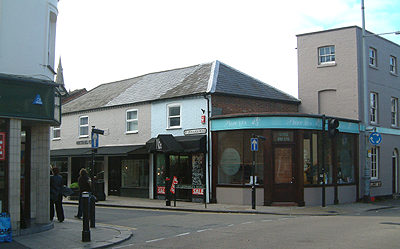
Samuel Wilkinson's
home.
On the right, the curved
shop front of the actual Cross's Corner, seed merchants
at that time, then no. 4 St Leonard's Road, now painted
blue, and beside that no. 6, the small terraced cottage
where the Wilkinson family lived. His father, George Wilkinson,
was a boot maker by trade so it is possible they 'lived above
the shop'. By the 1930s these premises were certainly shops and
may well have been at the turn of the last century.
Samuel Wilkinson's
Diary
6,
St. Leonard's Road
Windsor

This book records his doings during his
annual holiday of 1902 from August 9th to August 13th.
S.W. trusts that his readers will excuse
the handwriting but for the sake of economy he is unable to put
anything better before their eyes in the way of type.
Saturday August 9th
Bang! I awoke from my sleep and looked
at my watch. 6 o'clock; what was up? Bang! Went a second report
louder than the first, and thoroughly aroused I jumped out of
the bed and looked out of the window, and as my eyes lighted
on the festive decorations and flags on the other side of the
road I realised what it meant. Of course it was Coronation Day
and the two reports were signals from the Fire Station. Here
I yawned and after gazing pensively at the dull and gloomy sky
I crept back into bed again. By this time father had awakened
and together we laid listening to the sounds of the traffic which
was beginning to stir in the streets. A clatter of horses hoofs
in the distance was heard; father got out of bed, went to the
window and found it was the Life Guards in state dress proceeding
to the station en route for London to take part in the Coronation. He called me to come and
look at their gorgeous uniforms,
but the appeal fell on deaf ears I was asleep.
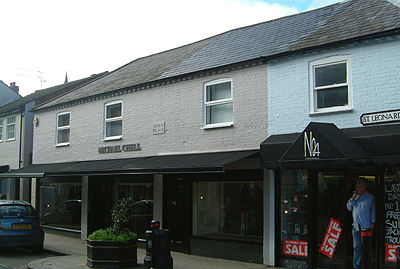 Samuel's home,
No 6, St Leonard's Road (Ann's Place), to the left of the blue
cottage, and now part of the premises of Michael Chell, men's
outfitters.
Samuel's home,
No 6, St Leonard's Road (Ann's Place), to the left of the blue
cottage, and now part of the premises of Michael Chell, men's
outfitters.
"We'll be merry
Drinking whisky, wine and sherry
We'll be merry
On Coronation Day"
This refrain was borne upon my ears as
I sat at breakfast. The singers were a party of holiday makers
who were no doubt determined to start the festivities in good
time, so here they were, going along arm in arm singing that
infernal Coronation ditty with such persistence that I very nearly
grew to be sick of the "we-e-ll be merry" before
the day was half over. I finished my dressing etc about nine
o'clock and strolled down to the office.
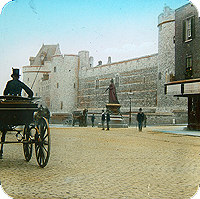 A hand coloured lantern slide
of
A hand coloured lantern slide
of
Peascod Street from around 1902
Peascod St. was bravely resplendent in
flags and bunting, whilst the "God Save the King"s
and the "E.R."s and other heartfelt mottoes
were scattered over the motley fronts of the houses in a reckless
fashion regardless of tone or effect. The Town Hall certainly
looked splendid, and the illumination of the flowers, corners
etc would no doubt look very pretty and effective at night.
There was not such a crowd of people
about at that hour, and I continued my way down the hill examining
the decorations as I went along. It took me a quarter of an hour
to find the keys of the goods shed. I unlocked the gates and
fell onto the office work. I was the only occupant of the building,
- except the cats- and all was silent as the grave. Occasionally
the strident voices of the trippers could be heard avowing that
they would be "merry". A train would rush in
now and then disgorging its load of passengers. After I had finished
the Company's work I did a bit of my own, and at 11.45 finished,
and prepared to start off home to dinner.
The streets were beginning to fill up
with people of the town and neighbouring villages. The petty
hawkers were noisily proclaiming their wares with their usual
bawling tones. "Who'll 'ave a ju-ja; all the fun of the
fair, the Coronashun tiddler, one penny. De Coronashun soo-ver-nier,
all de portrates of der royal famerlee". Such were the
announcements the itinerant hawkers made, who with their commodious
baskets on their knees stood upon the kerbstones and pushed their
wares into the midst of the fast increasing crowds.
As you passed along a book of glaring
portraits would be thrust under your nose, and the vendor would
press you to buy it for "tuppence". Anon, a bladder
would fly by within an inch of your face; peacocks feathers whisk
round your ears, whilst wailing penny bagpipes help to make the
scene a regular pandemonium of noise and bustle.
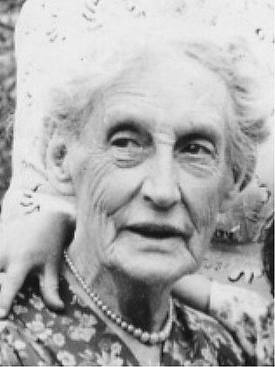 'Lizzie' Powrie, née Wilkinson
'Lizzie' Powrie, née Wilkinson
circa 1955
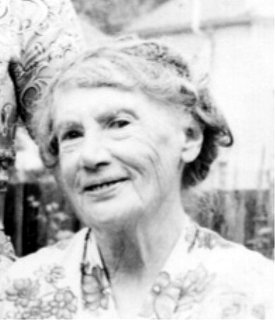 Alice Pembroke, née Wilkinson
Alice Pembroke, née Wilkinson
circa 1955
I escaped from the "ju-jas"
and "dusters" and reached home. It was after twelve,
and not seeing the girls about asked father where they were.
"Gone up the street". As it would be some time before
they were likely to come home I started to lay the dinner. With
father's assistance I managed to dish it up, and we sat down
and dined. The girls strolled in about 2.00pm each waving one
of those infernal "flickers". Alice sat down and began
to fan herself with the "Coronation duster". Lizzie
did likewise; so I took up my cap and went out with a view of
seeing the Venetian Fete that was supposed to take place off
the Alexandra Gardens. I went by way of the back streets and
reached the Gardens about 2.30. There was a good sprinkling of
people along the esplanade, but no signs of any sports. A scaffold
pole on two trestles (presumably the "greasy" pole)
was stretched across the river. A small red flag (very dirty)
fluttered dismally about the water, halfway between Boddy's boathouse
and the Eyot. A small tent was erected on the latter for the
competitors to dress in, and about 6 policemen were guarding
an empty gate with nobody about. There was no signs of any of
the committee, so I concluded that I had come too early and walked
down the steps into the Gardens, and sinking on to one of the
seats gave myself up to meditation. My thoughts would not interest
my readers so I will not insert them.
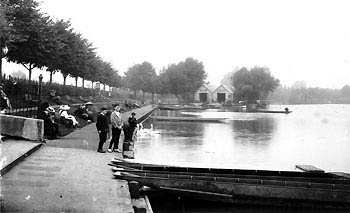 Windsor Promenade in the early
1900s
Windsor Promenade in the early
1900s
with Boddy's boathouses beyond.
See
Windsor Promenade
The weather was rather chilly, and I
devoutedly thanked Providence that I was not one of the competitors
in the swimming matches. A train was running out of the Great
Western Station, and every minute ran over a fog signal, which
startled the echoes with a loud report. At last it became too
cold to sit on the seat, so I got up, passed out of the gardens,
and walked along the path towards Clewer. As I passed by Boddy's
boathouse, I noticed a man occupied in tying about 20 squibs
to a long pole. This I surmised was part and parcel of the "grand
display" of fireworks that was to take place in the evening.
There were no people about Clewer and I pushed open the gate
and passed into the deserted churchyard. I visited the different
graves and at last sat down behind a wall for further meditation.
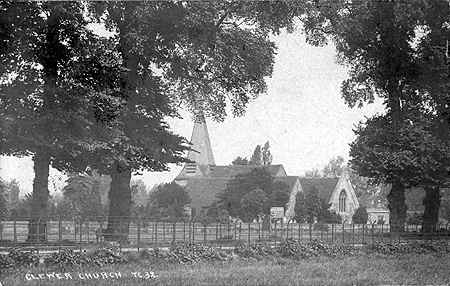 Clewer Church from across
the fields
Clewer Church from across
the fields
(From a postcard by T Cochrane)
How quiet everything was, even the birds
seemed to pour forth their melody in subdued notes, and I sat
there quiet and undisturbed. Overhead the heavy banks of clouds
were drifting up from the west, and I anticipated wet weather.
The dark trees in the churchyard seemed to shudder and whisper
as the soft wind rustled through their branches. Directly in
front of me was a newly made grave, and as I rested my eyes upon
it I noticed 2 jam jars, one at each end, adorned with Messrs.
Crosse & Blackwell's labels which proclaimed that the vessels
had originally contained apricot and raspberry jam respectively.
The idea of an illustrated jam jar adorning a grave so appealed
to my humour that unconsciously my features relaxed into a smile.
Presently a drop of rain fell followed by more, but a large tree
at my side sheltered me from the weather, so I did not move but
sat where I was, watching the drizzly downpour and listening
to the murmur of the rain as it fell on the leaves and flowers.
Suddenly a peal of bells burst forth and a strain of clamorous
iron proclaimed the eventful day.
I listened to the sound until it ceased
and then got up and passed out into the road. I pursued my way
through the village, over the fields, up the New Road, [now named Clarence Road, Ed.]
and into the allotments. I had a
look at my special mummy peas* and then proceeded home.
After tea I offered to take Alice down
the Brocas to witness the fag end of the Venetian Fete. It is
not very often that I go out with my sisters, so my offer of
my distinguished escort was, as you may suppose, readily accepted.
We passed up Peascod Street through the crowds, and upon arrival
at the top of the Great Western Station decided to wait there
a bit to see if any of the troops were come back from the Coronation.
However, none turned up, so after a short wait we continued our
way. All the way down Thames Street the people were surging about,
while the "bladders" and "ju-jas" flew about
with resounding "whacks". The "trippers"
were beginning to feel what is known as "that tired feeling"
which is so prevalent after frequent visits to the houses of
refreshment, but they were far from quiet, and in thick maudlin
voices howlingly assured the people round them that they would
still be "meree-e-e on Corra-na-a-shun da-a-ay".
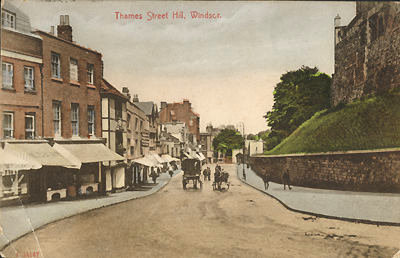 A tinted postcard of Lower
Thames Street
A tinted postcard of Lower
Thames Street
from about the time Samuel wrote his diary
The Bridge was crowded and so was the
Brocas. We pushed our way through the people and was in time
to witness a tub race between three small boys, who in 3 tubs
were paddling and splashing vigorously along the course. The
people were cheering the leader, but as I noticed the expression
on the face of the probable winner, I foresaw trouble ahead.
Presently his tub began to fill with water owing to leak he had
overlooked. It sank lower and lower until at last it disappeared
with a delightful gurgle, leaving the now despairing youngster
struggling in the cold water. The second nipper now began to
splash more vigorously and succeeded in capturing the prize.
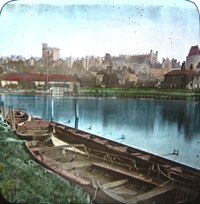 A view from the Brocas in
Samuel Wilkinson's day
A view from the Brocas in
Samuel Wilkinson's day
(A hand coloured lantern slide)
Next came the greasy pole with its attendant
fun; one by one the youngsters flopped into the river; eventually
some urchin walked off with the leg of mutton, and a tug of war
between two punts commenced. This event took place at some distance
to the right of us, and as the two competing punts were closely
surrounded by all sorts of small craft, we had very little to
see. This proved to be very annoying to one old gent beside us,
who proclaimed in angry tones that the idea of the boats shutting
out his view was "shameful", and it was a disgraceful
state of things when anybody couldn't see because a lot of beastly
people and boats kept sticking around. The effect of the old
gent's wrath upon me was so, that I had a hard job to stop myself
from laughing outright. We did not wait to hear the conclusion
but moved off. We walked along the bank of the river nodding
to those of our acquaintance whom we passed. Presently a large
black cloud sailed up.
"Here Alice" I remarked "I
think we'd better get under shelter before it comes on to rain;
look at that cloud".
We passed off the field into Brocas Street
and sought the shelter of a large archway which was already occupied
by a pram and party. Other people noticed the cloud and soon
the arch was packed with a crowd of people, not to mention four
prams and about ten babies; and then the rain fell regular
torrent. We looked out and watched the crowds of silk dressed
and laced humanity go flying by in their finery. We then turned
our attention to the interior of the arch. Two of the babies
were in the throes of personal agonies, and were roaring as loud
as they could. A crowd of sympathetic females swarmed around
with consoling and endearing gestures, making the prams darker
than ever and reducing the occupants thereof to a state of infantile
delirium. Another fond parent was tossing his offspring up and
down, and holding the small youngster suspended in mid-air, disclosing
its bare legs to the complacent gaze of "yours truly",
whilst the chuckling infant struggled and kicked its legs about
to the no small danger of the peoples' hats and faces. Other
parents were occupied in comforting their respective charges
who, terrified by the state of the weather, yelled, laughed,
shrieked, chuckled and howled alternately. At last the downpour
ceased and the people thronged out of the archway, us included.
As we had a good deal of time to spare,
we went down to Mrs Hammond's for half an hour. As we came out
of her house, the sky was getting dark and night was falling.
Up High Street, Eton and Thames Street the houses on each side
were lighting up their illuminations. I took Alice into Togni's
Café and we partook of ices and wafers which were enjoyed
immensely.
On arrival at home I left Alice indoors
and went out again. I passed up Peascod Street, down Thames Street,
and along Eton, where all was one blaze of lights, red, white
and blue. I retraced my steps to Windsor and passed along High
Street to the top of the Long Walk. At this point a large crowd
had assembled, I elbowed my way to the front and gazed into the
blackness of the night. Far away down the 3 miles of the Long
Walk flickered a flame; so small that it looked no bigger than
the flame of a candle held at arm's length. The mind could not
grasp the realisation that this small flame was a huge bonfire;
but when you raised your eyes to the sky, - then could one realise
the grandness of it. Far across the vault of heaven stretched
the huge expanse of bright, red glow, that quivered at each bursting
glare. The sky was bathed in lurid red, and the effect was one
that should have stilled the heart of every being who witnessed
the impressive and awe inspiring scene.
I retraced my steps along the High Street,
my mind stirred up by thoughts anew, and I passed through the
streets home and thence to bed. Thus ended my first day in the
holidays and at eleven o'clock I passed into the Land of Nod
with this lullaby rising from the streets below,
"We'll be merry,
Drinking whisky, wine and sherry,
We'll be merry,
On Coronation Day"
Footnotes
Jim Powrie, who transcribed
Samuels' diary, has provided the following notes:
- The author was Samuel
Wilkinson born in Windsor in late 1882 and employed by the South
Western Railway Company as a goods clerk.
- His father was George
Wilkinson, born in 1838 in Staindrop, Co. Durham. He was a boot
maker by trade.
- Alice Wilkinson was
born in Windsor in 1880, sister of Samuel and employed as a dress
machinist (bodice and skirt) in 1901. She married Luke Pembroke
in 1916 and died in Old Windsor.
- Lizzie (Elizabeth) Wilkinson
was born in Windsor in 1873. She married Piper James Powrie of
the Scots Guards in Clewer Church in December 1902 on his return
from the Boer War. She died in Chelmsford in 1965.
- Mrs Hammond was Rachel,
born in about 1868. Sam visited them at their house at 8, Sunbury
Road, Eton.
- Togni's Café
was located at 131 Peascod Street and was run by Augustus and
Frances Togni émigrés from Switzerland.
- Sam's 'chum' was William
(Bill) Hammond and was about the same age as Sam. He is described
as a railway porter in the 1901 census.
- Flint's were wine &
spirit merchants and grocers located at 30, Thames Street. The
proprietor was Joseph Flint (a widower in 1902)
- Harry (Henry) Burgess
was another contemporary of Sam's. He worked at Flint's and lived
at 33, Grove Road in Windsor.
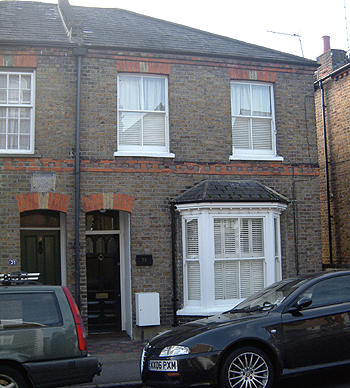 Harry Burgess
lived here at 33, Grove Road in Windsor.
Harry Burgess
lived here at 33, Grove Road in Windsor.
* Mummy peas are believed
to be the yellow crinkled variety, so called as similar pea seeds
had been found in Egyptian tombs.
Sunday August 10th
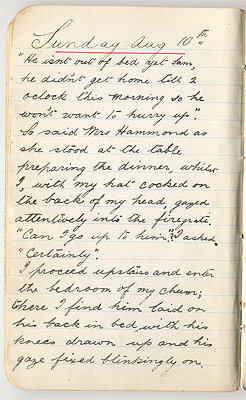
"He isn't out of bed yet Sam, he
didn't get home till 2 o'clock this morning so he won't want
to hurry up".
So said Mrs Hammond as she stood at the
table preparing the dinner, whilst I, with my hat cocked on the
back of my head, gazed attentively into the fire grate.
"Can I go up to him?" I asked.
"Certainly"
I proceed upstairs and enter the bedroom
of my chum; there I find him laid on his back in his bed, with
his knees drawn up and his gaze fixed blinkingly on the ceiling.
"Bon soir mon cher gascon"
I said "Comment vous portez vous?"
"What's the time?" was the
reply
"Half past ten"
The bed became the scene of a sudden
eruption; two long lean arms waved frantically about, the bedclothes
heaved up and down like the waves in the Bay of Biscay, and my
friend sat up. Seeing that my pal desired to get out and dress,
I went downstairs again and in a few minutes he joined me in
the parlour.
"Going up 12.23?" he enquired.
"Yes".
"Right you are, I'll be there".
"So long".
"Au revoir".
I pass out into Sunbury Road and proceed
home. The streets are littered with the remnants of yesterday's
festivities and the town wears a bedraggled aspect. The confetti
covers the streets and gutters like a powder, and strips of coloured
paper are scattered about the paths. The strains of the Life
Guards Band swell up from a distance, but I cannot spare time
to listen to it today. I have more important work to do.
Indoors father is cooking me a chop and
potatoes for my luncheon. This I digest and at twelve I am ready
for the day's enjoyment. I look at my watch, bids father goodbye
and passes out into the streets again. At the station I meet
my friend, and soon we are in a 3rd class compartment and bowling
swiftly towards the Metropolis. All the way up it rained until
it ceased at Clapham Jct. At Vauxhall, my chum, who was performing
collector's duty, left me, and at 10 to 2 we ran into Waterloo.
The North Station was destitute of trains except ours and only
a few people occupied the platforms. I passed out at the York
Road entrance, down Sutton Street and emerged onto the Rail and
footbridge. I passed rapidly over with the noisy trains on my
left and the low tide river on my right. I passed down the steps,
ran up Villiers Street and emerged into The Strand. I did not
pause but pursued my way through Duncannon Street, Pall Mall
East, Pall Mall, St. James Street, Piccadilly to Hyde Park Corner.
All along the way the houses were covered with all sorts of decorations,
and flags and bunting waved jauntily in the misty air. I will
not stop to give details of all the splendid things I saw in
the way of decoration as it would take up too much space. I arrived
at Hyde Park Corner and took a bus to the Albert Hall; we passed
along Knightsbridge with its barracks and presently came in sight
of the circular roof of the Hall, while opposite, the Albert
Memorial reared its splendid canopy to the dull sky. I descend
from the bus and walk round the Hall to find a stand. Eventually
I take up my position at the 1/= doors (balcony) and await the
opening of the portals.
Presently, the "toffs" begin
to arrive in cabs and hansoms, and soon the 1/= doors were thickly
populated. At 3.00pm the doors opened and we all passed in -
not with a rush, but gently and calmly; in fact, if a stranger
had noticed me, he would have been under the impression that
I was in the habit of going every Sunday, so unobtrusive was
my demeanour.
I purchase my ticket; a gent with a top
hat tears a corner off at the bottom of the stairs; I ascend,
I buy a programme at a counter; I pass under a low doorway and
then I enter THE HALL.
The first sight of that vast interior
of the building will never be effaced from my memory. Round and
round the building rose tier after tier of seats, (I was in the
middle, about half way between the roof and the arena), the dome
and the roof was entirely of glass and a huge stretch of canvas
kept the sun out. On the top of the incline stood the Free Gallery
with its circle of massive pillars that stood out boldly against
the background of the large red curtains. The arena was covered
with seats likewise. It's impossible for me to describe the vastness
of the place, but when I tell you that there was seating accommodation
for 10,000 people in the audience, and 1,000 in the choir, you
will perhaps be able to realise for yourselves. In fact, the
whole building was the same style as the original Colosseum at
Rome only smaller.
The organ was one of the most magnificent
and largest I have seen. Presently the Band of the Coldstream
Guards came in with full uniform; they arranged themselves in
the orchestra, which in spite of their presence, looked empty
with its 1,000 seats.
Listen! With a piercing sound the voice
of the grand organ is heard; the strains of the sacred march
echo around the vast hall; up to the lofty roof the music rises
with a triumphant chant, the organ's voice swells louder and
louder until the hall is full of weird vibrations.
"Zadok the Priest"
'tis a fitting name for such a triumphal song.
The Hall is changed, instead, I see as
through a mist the vast stadium of an ancient race thronged with
its thousands of people. The King is enthroned in regal state,
and all eyes are turned upon the sandy plain of the arena. The
strains of the organ thrill on and on in one never changing note
of exultation and triumph. Through an arch of flowers a procession
of priest and singers passes. Maidens glide in and out of the
ranks and scatter flowers before them; - it is the Festival of
the Temple, and Zadok the priest comes to sanctify the people.
Louder peals the organ, swifter whirl the dancers, up to the
vault of heaven rise the voices of the people in one stirring
chant of praise.
The scene trembles before my vision,
the sounds of the organ die away, the vast assembly and the walls
of the amphitheatre melt as a mist in the rays of a rising sun,
and I awake to find myself in the Albert Hall and the
loud acclamation of the audience encoring the organist. As I
look down from my lofty seat I see a small figure emerge from
a side door in the orchestra and advance to the band. It is Rogan
the Bandmaster and presently the air is again agitated by the
sound of the overture. I will not describe the different musical
items of the afternoon, but let it suffice fro me to say that
I sat as one in a dream, regardless of the fact that three or
four people were monopolising my programme.
At last it came to an end and I passed
out of the hall. The fresh air seemed to revive me. I hailed
a bus and proceeded along Kensington High Street to Hammersmith.
Here I had a job to find a suitable teashop, but after half an
hour's walking about, I found one and managed to make a decent
meal.
The next scene dear readers, finds me
on the top of an electric tramcar bound for Kew Bridge. There
is a small family party on my left and the mother-in-law (presumably)
is doing all the talking. Kew looks just as busy as ever and
I step lightly over the bridge and in 3 minutes am strolling
through the magnificent walks of Kew Gardens. The birds are singing
lovely and as the sun is setting, all is cool and pleasant. I
begin to feel a bit tired and I look around for a quiet retired
seat; but alas, all are occupied; and as I pass every full seat
I begin to get desperate. Most of the secluded spots are the
abode of couples who spoon there for hours. There is the girl,
who leans back with her "fair" head resting on her
young man's neck; (we won't say shoulder) her mind is full of
the latest "novel" in the "Romance Novelette",
while the "young man" is mentally calculating what
it's going to cost him for the days "enjoyment".
Ah! An empty seat in the midst of bushes,
and not a vestige of humanity upon it, I sink into it and gaze
affectionately at a sparrow that is cleaning its feathers on
a neighbouring tree.
Fresh once more I pass out of the Southern
Gates and look up the road for a tram. One comes along
full up, so I walk all the way to Richmond; arriving there I
take a 2d bus to the Terrace Gardens, passing through the decorated
streets. The Gardens looked beautiful and I hurried up the steep
paths until I reached the summit. I passed on until I came to
the well-known seat. I sit down, and now I will tell you what
I saw.
Before me stretching to the south, was
one perfect panorama of green foliage. To the right, the setting
sun could be seen gleaming luridly through the trees. The sky
was covered with banks of fleecy clouds that drifted gently by.
Below was a silvery streak that wound in and out until it met
the heavens on the horizon; this was the River Thames, and in
places it reflected the setting sun like a stream of molten fire.
The birds were warbling their evensong, and the low wind surged
through the branches of the trees with a calming and seductive
sound. I sat there until eight and then passed out and down to
the station. Whilst waiting, I thought I would like a pennyworth
of confectionery. I walked up to a slot machine and selected
dates. I placed the penny in the slot but it would not pass down.
I pressed it down level with the plate and there it stuck. I
then had resource to the knife, and after 5 minutes hacking and
pecking I opened the drawer and had the satisfaction of earning
8 dates for 1 penny and ten minutes hard work.
My train came in just then and there
was a general scramble for seats. All of the thirds were full
up so I had to take refuge in a second. I arrived in Windsor
about half past nine and very shortly after was asleep.
Monday August 11th
When any individual wishes to inform
you that he was up at an unusual early hour, he remarks that
he was "up with the lark". Were I to use this phrase
today I should be a distinct liar, as I was not up with
the lark; but I was out of bed at 6.15am, and as that is a very
early hour for me to rise, I consider that it is worthy of note.
My breakfast consisted of a fried egg and bacon (the latter commodity
being very salty) besides the bread etc. I only required some
biscuits for lunch, but father insisted on adding some meat sandwiches.
At last I started off and as I passed by Flint's the grocers
in Thames Street I met Harry Burgess.
"What! On your holidays?"
"Not 'arf"
"Lucky beggar"
Outside the theatre hung the tattered
remains of a large Chinese umbrella that had formerly assisted
in decorating the portico; but 3 hours of rain had succeeded
in reducing it to its present wrecked appearance. At the Station
I encountered one or two of the chaps I knew and after a few
minutes talk I took up my seat in the 7.50, and at right time
departed. My first job was to regulate my chronometer (otherwise
watch) and then I sat down to view the well-known landscapes.
On my left amidst the morning sunlight rose the lofty towers
and terraces of Windsor Castle, embowered in masses of trees.
The grass in the Home Park glittered with the dew and I leaned
out and "sniffed" the brisk air with a delightful sensation.
At Staines the compartment filled up and remained so until we
reached Waterloo.
Here, all was bustle and noise. The morning
trains were running in one after another, discharging their loads
of busy people. I passed over the footbridge and emerged on No.
1 platform of the Central Station. The 9.27 was nearly full up
with sailors and soldiers en route to Southampton Docks. I walk
up and down the train, and at last am rewarded with a corner
seat. The time flies by rapidly and soon we pass out of the station.
The other occupants of the compartment had no peculiarities to
speak about and as we thunder along I pass the time by watching
the scenery. At Winchester (our first stop) four of us got out
and stretched our legs on the platform. At Eastleigh, I found
the Bournemouth train nearly full up so I rode as far as Brockenhurst
in a second, along with a clergyman, a soldier, and a cast iron
featured man who was savagely sucking on a huge cigar. At Brockenhurst
I got in with a family, father, mother, 2 eldest daughters and
4 youngsters. I must pass a few remarks on the mother. While
all the rest of the family were gay, she was leaning back with
a novel stuck in her fist and one of the most deplorable and
miserable expressions on her face I have ever seen. This gloomy
look was fixed on her dial all the way, so I suppose it was her
habitual expression. As we left Brockenhurst we passed by a pub,
and judging by the longing glance the father directed towards
it I should say he was dying for a drink, and as I thought of
drinks I began to feel thirsty myself.
Bournemouth at last and 20 minutes late
in the bargain. I pass out and make a straight run for the pub.
Here I imbibe lemonade until I can imbibe no longer. I polish
off the sandwiches and throw the paper away. I pass out of the
pub and walk along the Bath Road. I turn round to the left and
before me stretches the sea. I stand on the top of the
cliffs and below lies the beach with the waves dashing themselves
against the shingle. I drink in the beauty of the scene and walk
along the right towards Bournemouth Pier. I come to a flight
of step leading down to the beach and descend them. I walk through
the dry sinking sand to the edge of the water; here the sand
is wet and firm and I walk towards Boscombe pier with the waves
dashing against my feet. Above rises the steep sides of the cliffs
and on my right stretches the broad expanse of the English Channel.
I stepped out with a jaunty air. I inhaled the ozone from the
briny. I listened to the jingling sound of the receding waves.
My spirits rose to the point of exultation, and I was happy
yes, happy in the true sense of the word; tinged with but one
regret; - that I had not my father with me.
Boscombe beach was crowded with children
paddling in the waves. I passed up the sandy incline and entered
on the pier. Here I sat for ten minutes rest and inspected the
skeleton of some mammoth lobster, or something, that they had
got rigged up on the irons. A number of urchins were fishing
from the edge of the pier with varying results. I pass out and
enter Boscombe Chine. Here I ramble about the paths and emerge
against the Electric Trams. I board one and proceed back to Bournemouth.
At the Landsdown Hotel I take a 1d bus to the Winter Gardens.
The vehicle proceeds along at the rate of 1 mile an hour, and
after a "long" time I arrive at the entrance. I pass
through the charming walks and emerge at the entrance to the
Bournemouth Pier. Here I sit and watch the animated beach below.
Numbers of children are splashing about in the sea whilst others
are crowded around a Punch & Judy show. A group of niggers
are pounding away at some coon song. Presently I get up and proceed
on board the Swanage boat "Lord Elgin". I take up one
of the penny deck chairs and fix it at the rear of the boat.
I lean back and prepare to give myself up to the glories of an
hours ride across the sea to Swanage. The sun now shines steadily,
the steamers siren booms, and we and we are off.
We soon get into the regular run of the
thing; the passengers settle down and nothing is heard but the
throbbing of the engines, the hum of conversation, and the splash
of the water against the paddle blades. A slight breeze ruffles
the surface of the sea, and I lean back in the chair and enjoy
it all. Soon we leave Bournemouth in the distance with her rugged
line of khaki cliffs. We pass the outlet of Poole Harbour on
our right, and steam round the sharp cliffs and arrive in sight
of Swanage. A string band on board now strikes up and renders
a lively waltz. We arrive at Swanage all too soon and I enter
the town from the pier and quay. The streets, like all small
seaside towns, are very narrow and I toil up the steep paths
inland. After fifteen minutes hard climbing I stop and look around.
Below me lays Swanage in the centre of the bay, so often spoken
of as the "Naples" of England. Far across the blue
expanse of sea can be seen the dark outline of the Bournemouth
coast. It is impossible for me to describe the prettiness of
the scene and if you want to realise what it looked like you
must go and see for yourself.
I now descend and institute a search
for a tea room. When I go out for the day I always look after
this part of the programme with exceptional vigilance; more so
in fact than anything else. At last I found one with upstairs
tearooms. It was a large cool room, nicely furnished, and with
French windows overlooking the bay. 3 cups of tea, 9 slices of
bread and butter, and 2 boiled eggs for 10d; wasn't so bad
was it?
I stroll out and pass on to the pier
at 4.55pm. I see no boat where is it? I reach the pier
head and find about 50 people wildly arguing with the officials.
I make enquiries and find out that the Bournemouth boat sailed
at 4.45pm instead of her proper time vis 5.00pm. This appalling
news makes me feels sick for a minute or two, but I soon recover
and start pacing up and down the pier thinking. Presently
I stop my perambulations and approach the official.
"How far to the station, please?"
"Five minutes walk"
I pass of the pier and make my way to
the Railway Station. Here I look at the timetable and find that
my theory is correct; a train leaves at 5.25 and connects with
the 6.37 at Bournemouth, - the train I was to catch. Thus had
my presence of mind saved the day. I went out, twirling my walking
stick merrily, and purchased 4 oranges, 2 of which I dispensed
with there and then. As I passed by a low wall a ball of wet
sand came flying along and shattered itself on the breast of
my jacket and simultaneously, two little urchins ran away. It
soon brushed off and I proceeded back. Before I entered the train
I turned and gave a last look at the sea. The disappointed passengers
were still debating on the pier head and I smile a quiet "smile".
The scenery from Swanage to Bournemouth
was very beautiful, the heather, white hills and picturesque
houses making a delightful ride. We passed by Corfe Castle the
ruins of which stood out boldly against the blue sky. I arrived
at Bournemouth with ten minutes to spare. The 6.37 swings round
the curve and runs into the Station. I had a hard job to get
a seat. I rode from Bournemouth to Brockenhurst with a costermonger,
his wife and 3 squalid, squalling children. Next to me sat an
ugly bloated individual who looked like a retired coal heaver;
and to make matters look all the more amusing, the rest of the
compartment was occupied by a gentleman and 2 ladies, not to
mention a luncheon basket.
The costermonger amused himself by expectorating
out of the window all the way to Brockenhurst, and in this performance
he was accompanied by the other fellow who directed his attention
to the carriage floor instead of the permanent way. We passed
through the lovely scenery of the New Forest until we reached
Brockenhurst where I got out to look for a fresh seat. Before
I left the coster and his family I gave the kids the two remaining
oranges in my bag. At last I espied a lavatory carriage with
the "short" seat vacant here was a slice of luck.
I opened the door, glided in, and sat down. Simultaneously a
young lady emerged from the little door at my side, and after
looking hard at me took the remaining vacant seat (evidently
I had taken hers). I sat quietly all the way through the New
Forest to Southampton West, resting my arm on the cushioned rest
( the only arm rest fitted in the compartment). I had obtained
the best seat in the carriage and I didn't forget it either.
At So'ton West some people got out and
others got in, and after 2 minutes stop we steamed out on our
long run to Vauxhall. I now began to survey the compartment with
the object of putting myself in a comfortable position. The seat
I was on accommodated 4 persons, at present it only held 3; the
other 2 occupants being a chap and (presumably) his "tart".
I say "tart" because they were very affectionate towards
one another, and married people or brothers and sisters don't
as a rule exhibit any extraordinary symptoms of personal devotion
in a filled railway carriage. Anyhow they were squeezing themselves
against the window so I had plenty of room on either side for
the purpose of shifting my position; but I was desirous of stretching
my legs, so I now turned my attention to the opposite side. There
were five persons occupying the seat all were females.
On my extreme left was an old lady diligently reading "Answers".
A very plainly dressed but nice young woman came next perusing
the "How to Dress" column in "Home Notes"
or something beginning with "Home". Next came a flashily
dressed young female with a big hat and a glaring red jacket,
who talked volubly with her companion an old lady who said very
little in reply but nodded her head vigorously every now and
then to my no small amusement, as her bonnet contained a large
bunch of artificial cherries, and as she manipulated her head
these (which were made of a brittle material) kept up a lively
rattle. The final seat held an uprightly and stern featured woman
who never took her eyes off the page of a small book. I knew
she wasn't reading it because she never turned a single page
over all the way to Vauxhall, and yet her eyes were persistently
fixed upon the book.
I desired to place my legs under the
seat but there was a solid wall of skirts from one end to the
other, so it was of no use. I thought of all sorts of plans and
the only one that seemed feasible was to change seats, but I
didn't like to ask anyone. I was leaning back and prepared to
do the best I could when the girl in the red jacket asked her
companion (who had shivered) if she was cold. In an instance
I was on my feet.
"Allow me to offer you my seat,
madam"
"Thank you very much, but I won't
trouble you, it was only a passing chill"
Here the remaining male member of the
community left off pressing his companion's hand and pulled up
the window, and I sank back into my seat baffled. At last
I manage to get my legs under the seat and I lean back with a
sigh of relief and all the way to London I doze away, thinking
of everything.
"Vauxhall, Vauxhall" yells
the porters.
I jump out and succeed in catching the
Windsor train with 2 minutes to spare. I will not pause on the
journey down but will bring the days diary to a close. As we
run into Windsor I notice the Castle is brilliantly lit up and
on the platform stands Bill Hammond.
"How did you get on?" he asks
"Alright, old man" I reply.
"In fact I am what you might call tired but happy".
We emerge out in the roadway.
"Come along, mon ami" I say,
"We'll go and have a drink".
Here ensues a search for a suitable pub,
at last we find room in the bar at the 'South Western Hotel'.
"Two small lemons, please"
Over this light refreshment we converse
and at 10.30 bid each other good night. Up the street the people
are having a fine old time of it. I pass through the Great Western
and so escape the ja-jas and the dusters. I find father at home
all by himself and presently the girls turn up laughing loudly
over some joke I can't stop to write any more I'm
so thundering tired good night?
The girls' laughter reminds me of Shakespeare's
words "and the loud laugh that spoke the vacant mind"
Tuesday August 12th
I am up again at 6.15 and in due course
am travelling along to Waterloo by the 7.50 train. The weather
is dull and I am afraid I shall have a wet day. It is not so
busy at Waterloo as it was yesterday and I am not long in finding
a vacant seat in a lavatory carriage. I immediately seat myself
opposite the little door and stretch my legs as much as I like.
I pass away the time by reading the 'Daily Mail' and as we glide
out of Waterloo I lay it down and glance at the rest of the passengers.
An elderly gentleman, his wife and a young fellow who (judging
by the conversation) was their nephew or a friend. They had an
enormous amount of luggage and a good deal of time was spent
in arranging it on the racks and even then, the seats were piled
up with tourist guides to Winchester (where they were bound for)
maps and catalogues, not to mention two baskets and one bag of
provisions. Before they were 10 minutes out of Waterloo they
had started on the grub. At Surbiton the three of them were hanging
out of the window, peeling boiled eggs, and what with sandwiches,
biscuits, buns, cakes, tarts and half a dozen bottles of drink
it was quite a grand spread, and in spite of everything, it made
me quite hungry, so I bought out my modest small parcel and disposed
of 6 biscuits. I had nothing to drink so restrained my thirst
until I arrived at Southamptom. All the way to Winchester they
kept eating and apparently took no notice of how the time was
passing. We ran into Winchester and then ensued a flying series
of the vanishing tricks. Bottles and half opened parcels of food
were shoved into baskets and bags with rapid haste and as the
young man was lifting a large bundle of cricket stumps, bats,
walking sticks and umbrellas from the rack, the blessed strap
broke and showered the lot over the compartment. Laugh? I thought
I should have choked. The young man, with a face like a beetroot,
scrambled the lot together and they all cleared off.
A young lady got in and all the way to
Southampton I gazed at the bits of eggshells, orange peel, paper,
crumbs etc and meditated on the slovenliness of the human race
in general.
"Small lemon, please". I leaned
back in the bar and quaffed the fizzy liquor. I had arrived at
Southampton and was now actively engaged in quenching my thirst
and supplying the needs of the "inner man". Five minutes
later saw me splashing through the mud of the docks, along the
ocean quay to the transport 'Sicilia' which was about
to sail. When I reached her I found that she did not sail until
2.30pm, so I calmly walked up the gangway and passed all over
the vessel. I stood on the upper bridge and watched the busy
life below, until the stentorian voice of a sailor told me to
come down. I passed forward and then looked at the cooking department
which was crowded by a number of Lassars and orientals who jabbered
away in their strange tongue. I left the "Sicilia"
and made a very extensive visit of the docks.
I viewed the new graving dock being constructed
and also the Cold Storage buildings, lairs, abbatoirs etc, etc.
I walked around the Empress, Inner and Outer coal docks, looked
all over the sheds and went on board the following vessels:
'Zanzibar' ,
a timber vessel manned by foreign sailors.
'Zoe' a dirty cargo vessel.
'Rock City' a small sailing vessel but very neat and trim.
'Elbe' a large liner in the Brazilian and South American
service. I gave the mate 6d to show me over the State sleeping
berths.
The famous vessels of the Castle Line 'Kildonan Castle'
and 'Carisbrook Castle'.
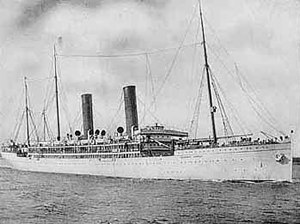 Kildonan Castle from a contemporary
postcard
Kildonan Castle from a contemporary
postcard
Also the following miscellaneous liners:
'Danube, Custodian, Clyde, Mohawk, La Plata' and also
the Channel Island steamers 'Lydia, Hilda and South Western'.
I also went over the 'Hardinger' which is now taking back
the colonial and native troops who came over for the Coronation.
I passed from one ship to another and
trudged from dock to dock until I was dead tired. I passed out
of the docks and proceeded to the floating bridge where I passed
over to Woolston which is situated on the other side of the Itchen.
I crawled about Woolston until I found a teashop and partook
of boiled eggs and bread and butter. I then retraced my steps
to Southampton and boarded the electric trams. These landed me
in High Street and after purchasing some pears, I wended my way
to the Royal Pier.
Here I had the opportunity of inspecting
the new pleasure steamers 'Balmoral and Lorna Doone', both
splendid boats. I sit for 20 minutes on a seat and eat my pears.
By that time, I am rested an stroll to the edge of the pier and
watch the departure of the aforementioned vessels. A big man
with a 40 shilling boating costume, spectacles, pipe and a navy
cap with a very big peak was strutting up and down the planks
airing his opinion of everything in general, and I watched him
with amused contempt. Oh yes, he knew every boat in the English
Channel and explained what he should do in steering the
fleet in the forthcoming naval review with the easy nonchalance
of a first class admiral, and when some old lady came up and
asked the next boat to Cowes he didn't know.
A large steamer (the 'Jupiter')
collided with the Town Quay while I was on the pier doing considerable
damage. I passed off and as I felt hungry again I went and had
another tea. I then boarded the trams and shortly after stood
on Southampton West platform waiting for the London express.
I had a very comfortable seat, plenty
of room to sit, was able to stretch my legs and feet to the utmost
and yet did not feel satisfied. Yesterday I had passed
the time listening to the conversation but today everybody was
silent or reading, so I was thrown upon my resources for something
to do and as nothing of an edifying aspect presented itself to
my gaze I was dissatisfied.
I amused myself by studying the other
occupants of the carriage. On the left hand seat opposite, a
small lean, pale looking man was sitting, the only part of his
person visible being his legs and feet.
Next to him sat (or reclined) a large
stout woman (presumably his wife) who was sitting slightly sideways
and deliberately laying back on him, thus causing the
partial eclipse" of her better half. The sight of this lady
and the human cushion nearly caused me to laugh outright, and
when the small man started to feed himself with biscuits by inserting
them through the open space between the window and her broad
fat shoulders, I was obliged to turn my head away and blow my
nose violently.
At the other end of the seat was a young
and rather nice looking girl and I was so struck (as you might
say) by her face that I gazed at her until she suddenly looked
up from her book and she blushed so much that if I had been any
ordinary light-headed youth, I should have fallen head over ears
in love with her but not so. I merely removed my gaze from
her juvenile features and transferred it to a harmless fly that
was perambulating over the ceiling as well as the rocky motion
of the carriage would let it.
On my left sat two simpering, giggling
lovers. Oh those lovers -. I fall across them at every
twist of life. The female looks at me with a pitying gaze as
if I were some mortal whose existence was incomplete and who
wanted but the society and love (?) of an earthly "angel"
to make life worth living. The man (when his glance falls upon
me) presses his "donah" closer to his throbbing manly
heart; vaguely conscious of a rival in the field and peers at
me as if I was a walking tomb of misery.
"Ah" he would think, "you
don't know what bliss and happiness it is to participate in the
love of a nice young woman. If you had a 'tart' you would be
a different man" (I think I deserve the title of man)
"you would be full of love and joy and your life would seem
a patch of roses".
"Yes" I inwardly reply "such
would be the case, but unless I am sure of the prospective happiness
and joy I am rather doubtful about taking to the 'rosy path'.
A man may look very happy with his so called sweetheart but I've
had a little experience in that sort of thing and I am
dubious".
As I was remarking, these were two lovers,
and their united gaze was fixed on a book of views. Their craniums
were very close together, and every now and then the girl would
turn and leer at "him"; while he would return the compliment
by making a similar leer at "her". Then they would
giggle and he would poke his finger between her ribs; then she
would make a little jump and utter a consumptive squeak, (you
can't call it anything else), then blush and try and look innocent,
the young man would whisper a few "honeyed words" into
her ear and they would bury their faces in the pictures again.
On my right sat a young woman reading,
and next to her an old lady whose husband sat immediately opposite
me. This old gentleman was like me had nothing to do. We
sat and looked at one another, but neither of us had the courage
to break the silence. The lovers had left off looking at the
book of views and were now engaged in gazing at the sunset. The
fat old girl was still reclining on her "hubby"
nearly asleep. The nice looking girl was dozing. The old lady
and young woman on my right were still reading, and save for
the noise of the train, nothing was heard.
We were 8 minutes late at Eastleigh,
and all the way up from thee we had been going at a rapid speed.
We flashed through Basingstoke and on looking at my watch I found
that we were now only 7 minutes late one minute caught
up. I was dying to talk to someone and this was a good opportunity.
I coughed, leaned across to the old gentleman opposite and shouted
thus:
"If we keep on running the same
rate as we are now we shall get to Waterloo in good time".
I shall never, never forget the effect
those few words produced upon the company. The old girl jumped
off her husband's body and stared at me. The lovers turned their
heads and gazed at me as if I was some ornithological specimen.
The nice young girl woke up and smiled at us all and the two
ladies on my right turned and looked very hard at me. I leaned
back in my seat feeling as if I had committed some foul crime,
whilst the old gentleman I had address roused him self and said
"Beg pardon?" With a sickly smile I repeated my observation
and the old gent took up the thread at once and all the way to
Clapham we shouted to one another until we were blue in the face.
I had broken the ice and the old gent was thankful to get anyone
to talk to so the doings of the rest of the occupants were hereafter
unknown to me.
At Vauxhall I got out and passed down
the subway to the number 2 platform and was successful in catching
the 9.10 down. Nothing occurred of any note except that a chap
and girl got in at Richmond and all the way to Twickenham the
girl was chucking the chap under the chin and calling him all
the names she could think of. A friend once told me that when
you're in love, you don't notice the presence of other persons.
So it seems.
One more days holiday and it will all
be over so goodnight.
Wednesday August 13th
When I woke up at 8.00am I found that
my watch had gone wrong during the night and was half an hour
fast. It took me 20 minutes to put it right again and the result
was, that I had to rush through my breakfast and toilet and run
up the street doing my lunch up as I went. I bought the Daily
Telegraph to look and soon was steaming away from the land
of my birth. At Staines I changed into the up Reading train running
straight to Vauxhall and arriving in Waterloo 3 minutes late.
The first thing I did was go don the Waterloo Road and buy a
bottle of lemonade for consumption on the down journey. Then
I watched the departure of the 10.50 Plymouth Express. I walked
quickly up to the 11.10am train and saw a good seat vacant. A
lady and a little girl were arranging some luggage and as I stepped
in she turned round with a scowl and snapped out "There's
four seats taken here".
Considering there were seats for nine
in the compartment, I did not think it worthwhile to reply, so
I sat down (in the best seat you can bet) and buried my face
in the paper. Another lady came in and was met by the same uncivil
words of the woman.
"Oh" the lady replied "I'm
sure there's plenty of room" and went to shut the door when
the other female pushed it open again with the sharp remark that
there were some more people to come in, and the two of them looked
so hard at one another that I anticipated a fight -, but it didn't
come off. If that surly miserable bit of feminine gender had
said much to me I should have told her to "keep her hair
on" and no flies about it either. Presently the husband
(a big bouncing man) came up with a small child. Another lady
came in and we were soon off.
After leaving Surbiton I offered my paper
to the young woman next to me (which was accepted) and started
on my lunch. I ate it all except a few biscuits and washed it
down with the lemonade. I enjoyed it very much shall do the same
in future on long journeys. After lunch I gazed about me, and
having nothing to do I washed my hands and proceeded to watch
the new scenery through which I was about to pass. Hook Station
passed by with a flash and we rushed onward towards Basingstoke.
Presently sidings began to appear, wagons glided by, and with
a burst and roar we tore through the station.
At Winklebury Box we passed under the
up rails of the main Southampton Line, and now we paced the road
to Exeter. The scenery to Andover Junction was not so very imposing
and we arrived at Andover in a very fine rain. I got out and
walked up and down the platform. There was nothing very grand
about the station and I morbidly gazed at a couple of sheep who
were laid under the shelter of the station shed. The Amesbury
train rolled in and we departed for the west. Some time ago the
South Western Company had installed a pneumatic system of signals
between Andover and Grateley, and as I had never seen these worked
before I was anxious to observe their motions, so all the way
from Andover to Grateley I looked out every mile and witnessed
the rise of the automatic arms as soon as the train had passed
them.
The rain was falling all the time, so
what with the wet and the wind my bare head presented quite a
barbaric appearance, and as I was not inclined to catch a cold
I dried my head, smoothed my ruffled locks and felt comfortable
again, but what a dismal prospect. I glared at the dripping windows
and mentally cursed Jupiter and all his satellites.
I had not time to observe things at Grateley
so I determined to look at the new signal box on the return journey.
The Amesbury Branch is all new and the contractor's materials
still littered the place. The line slopes down very much from
Newton Toney to Amesbury, and our short train hurled down the
incline at a fearful speed. When I emerged at Amesbury the rain
had ceased, but all the way to the village the air was full of
(you might call it a 'Scotch') mist, so very fine that it looked
like a very thin vapour, and as I slipped and stumbled along
the muddy road (there were no paths) my spirits were not of the
highest. After careering along in this fashion for a mile I caught
sight of the village and I increased my gait and marched straight
into the solitary village pub. I sipped my lemonade and gazed
moodily at my muddy feet. However, it was no good being
miserable, I had come all this way to enjoy myself and I meant
to be happy if it was raging a blizzard so I swigged off the
last drop of drink and started my 2 mile walk to Stonehenge.
I passed by the old church with its sombre
coat of clinging ivy and the falling gravestones half hid by
the rank foliage and the uncut grass. I kept uphill for a mile
and then the road descended. As I passed along I looked out for
the field known as Vespasians Camp. Soon I saw it and
I leaned against a low wall and proceeded to have a good look
at it. In front of me was a large field covered with the remains
of deep trenches, that had at one time formed part of the natural
defences of a large camp; but they were now uneven and half filled
in, no trace of their original form remaining. But now let me
give you another view. I close my bodily eyes and set in motion
the machinery of my mental inspiration. What a change -.
Before me, under the dull evening sky
stretches a vast Roman camp asleep. The trenches are filled
with the soldiers leaning on their arms, nothing is heard but
the noise of the wind and the sharp cry of the watchers. The
broad spaces of the camp are covered with recumbent forms, warriors
sleeping on the eve of battle. In the centre of an open space
a large white tent raises its summit to the sky the same
that looks upon me now. Inside, the captains and centurions sit
in eager attitude, each man brimful of some stratagem which would
place the barbaric Britons at their mercy. Suddenly their voices
are hushed and their united gaze is riveted on the dark hangings
at the end of the tent. The drooping tapestries move and part,
and through them passes the form of Vespasian the Roman general.
All argument is over and a subtle commanding influence sways
the wills of those under him.
Thus stands (or stood) the Roman Camp,
hills all around glowed fitfully with the burning pyres of the
conquered savages. Under these strange thoughts of the past,
I continue my way, if these hills could speak what strange
tales we should learn. How few of us realise the mighty unseen
force of Nature. When the untaught barbarians swept the plains
with their savage hordes, these mounds stood under their tread.
Years roll on and nations change and change again yet nature
revolves its ponderous wheels, day by day, year by year, until
the present generation stands appalled at the dim past, and with
all this these hills still raise their round summits to
the heavens, silent and immovable witnesses of a creation and
a world; there they stand until all things shall pass away
while we small puny things that we are, can only take a
glimpse as we pass through our small fleeting "life"
and for a moment wonder.
I pass round a bend and before me stretches
4 or 5 miles of undulating scenery, and on a round hill just
below me stands those giant stones STONEHENGE. I hurry
forward and soon am passing through the wicket (where they charge
a shilling for admission). I pass forward half a dozen steps
and stop, look, think and then wonder. It is impossible
to describe the massive proportions of these stones; it defies
imagination and all that one can do is to wander mechanically
round and round their huge bases; their mental faculties numbed
by the dark mystery in which the origin of these monoliths is
lost. Here these stones have stood, ages have passed over
them and still their gigantic proportions rear themselves towards
heaven veritable sentinels of Salisbury Plain. What must
the Romans, Danes, Saxons and Normans have thought as they confronted
these circles; and yet scientific men want us to believe that,
owing to recent excavations, they are able to prove that these
stones existed long before the supposed creation.
When I look at the massive slabs placed
across on the top of the pillars, I try to realise the force
which the beings who erected them must have had at their disposal;
no modern machinery is capable of dealing with such work; and
as I look at them I feel inclined to believe that some super-natural
force was at work when the stones were erected. For all we know,
long before the Britons, long before the Egyptians, and long
before the Deluge, this small island was inhabited by a mighty
nation, greater and more powerful than ever we shall hope to
be; a race gifted with knowledge of things that we shall never
know. But the Flood came and wiped them off the face of the Earth,
and out of all their massive buildings and triumphs only
Stonehenge is left; a striking example of the futility of man
over nature and an awful testimony of the vengeance of God.
"Bismillah God is Great"
All the 3 miles back to Amesbury Station
I think and think, but it is no good. Many others like me have
puzzled themselves as to the meaning of these monuments,
but each one has had to give it up and I do the same.
The next scene finds me in the pneumatic
signal box at Grateley, and I am pushing and pulling the slots
under the direction of the signalman. It is a novel method of
signal work and as the framework is of glass, the intricate machinery
is disclosed to view. I pass out and await the down train. It
comes in and I take my seat. A lady gets in with 3 little girls
and the youngest is much afraid at the prospect of going through
the Salisbury Tunnel. The engine gives a shriek, the little girl
clings closer to her mother, and we are in darkness. We emerge
in to the light of day again and the little girl breaks into
a laugh, Salisbury, and I alight from the train.
The Company is building a new station
and everything seems upside down. I passed out and inspected
the town and market square. It was early closing day in Salisbury
so I did not see the beauty of the shops. I bent my steps in
the direction of the Cathedral and very soon had passed its scared
portals. I have seen many grand buildings but not such a one
as Salisbury Cathedral. Its lofty roof and multi-coloured windows,
the largeness of the interior, and the loftiness of its spire
(the highest in England). All go to make the sight an impressive
one. All round between the stone pillars of the aisle are tombs
of knights and soldiers; the features of the images being hardly
recognisable; so old and damaged; while the quaint figures of
saints ranged around the wall bring back to the mind the famous
legends of Old Sarum. I sit down for a moment and rest; it is
very peaceful in this old cathedral and unconsciously the troubles
of the world are forgotten in contemplating the quiet beauty
of this historical pile.
There was a flower show on somewhere
and the town was nearly deserted. As I have said before, I am
very particular about my tea and today I spent 45 minutes
in looking for a suitable place until I found one at last in
a quiet back street. Here I partook of boiled eggs, bread and
butter and tea for 1/=, and it was nice too.
So far, I had not had a single smoke
during the whole holiday, so I thought I would have a cigarette
or two. I went to a tobacconist's, made the necessary purchases,
lit a "fag" and took a gentle stroll to the station.
I was looking at the bookstall and having heard that the 'Adventures
of Captain Kettle' were very good and humorous, I purchased
a sixpenny edition with the intention of reading it en route.
It is not often that I read in the train, but today I was deep
in thought and wanted something more than mere talking to draw
me out of it. Presently, the Waterloo express ran in. I saw a
capital seat and took it. This train ran from Salisbury to Waterloo
without a stop and was one of the dining trains. The compartment
I was in was really a first class turned in a third so you can
guess it was "all right". There was only four of us
in it and as we steamed out of Salisbury I thought we should
have a nice ride up. I began to read, but somehow Stonehenge
and Salisbury Cathedral would persist in coming between the pages
and my eyes until at last I threw down 'Captain Kettle'
and gazed out of the window.
All the way up we rushed along at top
speed; through Basingstoke, Woking and Surbiton we tore, dashing
over and under bridges; trains houses and obstacles glided by
in one ever changing panorama, and at last we burst through Clapham
Junction and mingled with the Metropolis. The electric arc lamps
shed a weird light on the roads and roads of railway as we sped
along; here there were 8 roads running side by side. At Nine
Elms I glanced at the spectral rows of goods trucks that were
marshalled in long rows under the weird light glare of the arc
lamps; we slowed down and with a gentle vibration ran into Waterloo.
Here I had an hour to wait so I passed
the time by eating plums and jam tarts. I came down by the 9.10pm
Windsor and as this was the last stage of my holidays my thoughts
were naturally absent, so what occurred to me on the down journey
is unknown to me. I landed home safe, and as I get into bed I
ask myself if I have enjoyed my holidays and I reply
YES
Conclusion
Now that I have brought this diary to
a close let me make a few remarks upon the same. I started this
book with the intention of writing a diary, but I find I am writing
a diary, novel treatise, all in one, besides a few lines on philosophy.
But you must bear with me and remember
that I am only an amateur in writings, and if I have made mistakes
in spelling, grammar etc, it was during the time I was carried
away by my fervour, and not intentionally. I have omitted all
questions of time table because some of my readers would not
care to be informed that a train left at so and so, when it is
a matter of perfect indifference to them whether it left at 12
noon or 12 midnight.
It is considered the correct thing nowadays
to have a few home made verses at the end of the book, so I have
shoved in ten, and if these are not enough for you, you must
make some more yourself.
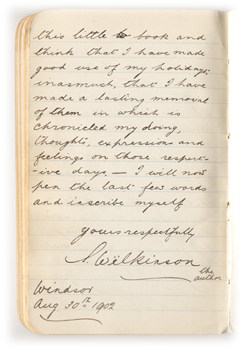
In years to come, my views of life might
change, but I shall always look at this little book and think
that I have made good use of my holidays, inasmuch, that I have
made a lasting memorial of them in which is chronicled my doing,
thoughts, expressions and feelings on those respective days.
I will now pen the last few words and inscribe myself
Yours respectfully
S. Wilkinson
The Author
Windsor
August 30th 1902
The following verses were constructed
by me on the spur of the moment; they are not very expressive
in their words but I must ask you to read them with a little
commiseration for the poet.
SW
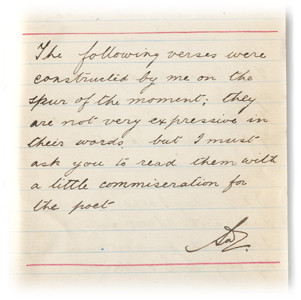
I've been upon a holiday,
To places all around,
I started off on pleasure bent,
Returning safe and sound
The Coronation day was spent,
By wand'ring up and down,
In those old dirty streets,
Of Windsor's ancient town
On Sunday I departed hence,
And in the Albert Halls,
I heard the grandest music that,
My very soul enthrals
In Richmond's terrace gardens green,
Neath mur'mring sylvan glades,
I watch the setting of the sun,
Till night has shed its shades
I stand upon the Bournemouth Cliffs,
The sea my optics sweep,
And nought is heard except the sound,
Of voices of the deep
And in the boat I ride upon,
The bosom of the sea,
And then at Swanage later on,
I eat a hearty tea (?)
Southampton Docks with mud galore,
Attracts my eager mind,
I drink in all the sight I see,
And ships of every kind
And when at even, homeward bound,
Some fun attracts my eyes,
I talk with some old gentleman,
And watch his spirits rise
Dark Stonehenge with its hills around,
Depicts an ancient race,
Wild my'stries dreamt by few of men,
Regard us in the face
At Sarum's spire I gaze with awe,
I wander round all day,
At home again at night I close,
Another holiday
The End
Background and Introduction
to
Sarah Jane Ward's Diary
of July 1902
A few months after Samuel Wilkinson's
diary of 1902 was included here on the Royal Windsor Website,
we were delighted to hear from another branch of Samuel's family,
this time in the North of England. They had been surprised to
find his diary available on the web, and were even more surprised
to discover that it had been sent to us by a long-lost branch
of their family now living in Italy (2006).
Imagine our surprise and delight
therefore when the Middleton family sent the following diary
written by a cousin of Samuel Wilkinson, Sarah Jane Ward. It
describes a holiday that Sarah
Jane spent in Windsor just weeks before Samuel wrote his diary.
We are particularly pleased to note that Sarah Jane records a
visit to Alexandra
Gardens
to watch the opening ceremony performed by Princess Christian.
July 1902
The Diary of Sarah Jane Ward
Our
visit to London and Windsor
Saturday,
July 12th
We arrived
in London at 6.30am. Uncle George met us at Kings Cross. We had
breakfast, then went to Spitalfield meat-market, past the Royal
Mint, on to Tower Bridge. We saw the bridge working. It was a
splendid sight. Then we went inside the Tower of London. Here
we saw the Scots Guards and the Irish Fusiliers depart to meet
Lord Kitchener. We also saw the Gun Carriage on which were carried
the remains of our late Queen Victoria. The Crown Jewels were
a splendid sight to behold.
After
dinner we went on London Bridge and saw the Pearl Life Insurance
Office. Then we took the bus to Saint Paul's, there was a great
dome towering up above the noise, confusion and strife of London;
inside St. Paul's it was like a haven of rest and we would gladly
have stayed there much longer, but no, we have not finished our
journeyings, so out into the busy streets once more we went.
We took the bus down The Strand to Trafalgar Square, Nelson's
Monument, and we saw through the National Gallery, had a look
at the Canadian Arch, through Horse Guards Parade, saw the Duke
of York's Column, and Pall Mall. After tea we had a walk on Regent
Street, past Piccadilly Circus, Oxford Street, then on to Marble
Arch. We just had a peep in Hyde Park, then on to Paddington
Station where we took the train for Windsor. We arrived at 7.00pm.
Alice and Sam met us at the G.W.R. station. I can't say how glad
I was when I saw them; we greeted each other warmly. I was introduced
to Sam's dearest friend Bill Hammond, he helped to carry our
luggage to uncle's, here was Lizzie to greet us, we were very
pleased to see her looking so well;
she had tea prepared for us, for which we were very thankful
after our long journey. Then Lizzie and Alice took me to see
Windsor on Saturday night; it was quite busy in a small way.
Then we returned to uncle's and had slight refreshments. Lizzie,
Alice and Sam took us to cousin Will's, they were very pleased
to see us. We sat talking for a short time but we were beginning
to feel tired after our wanderings so we said 'Good night' and
retired.
Sunday,
July 13th
Rose
at 7am and had breakfast, Alice and Sam came to take us to Holy
Trinity Church, we saw the 3rd. Battalion, Scot's Guards, and
2nd. Life Guards, parade to church, after the service we followed
them to barracks, then Alice, Sam and I went for a walk before
dinner.
We had a good dinner, Lizzie is a first class cook. In the afternoon
we went to the Castle
on the East Terrace to hear the bands play. It was all that could
be desired, we got a nice seat on the North Terrace and enjoyed
the beautiful scenery all around us, then we walked to cousin
Will's to tea, it was a kind of family gathering. In the evening
we went to Clewer Churchyard and saw the graves of the departed,
it all seemed quiet and peaceful
that this verse seemed to fit exactly with our surroundings.
Peace
perfect Peace.
With loved ones far away.
In Jesus's keeping
We are safe and they.
From
there we went to the riverside, sat down to rest for a while,
and Lizzie, Alice Sam and
I had a stroll over to the locks, we sat down on the steps and
watched the boats go through,
then came back on the other side of the river and had a ferry
across.
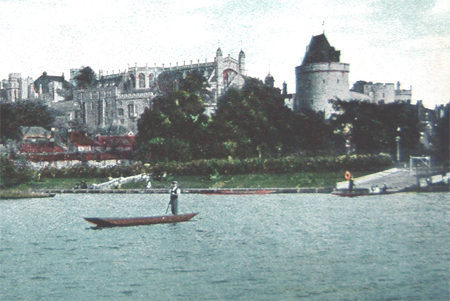 The
ferry from The Brocas to Windsor
promenade
The
ferry from The Brocas to Windsor
promenade
about the time of Sarah Jane's visit
Then
we went to cousin Will's, had supper, said 'Good night' and retired.
Monday,
July 14th
Rose
at 7am. Had breakfast and went out and met Lizzie on the road,
she took us to St. George's Chapel to the Service. The singing
was beautiful, then we walked over to uncle's and had dinner.
In the afternoon we had a drive to Eton, saw Eton College and
the chapel. We walked through Eton back home again and saw a
large number of College boys buying something nice for tea. After
tea Sam took Liz and I for a walk to Windsor Great Park. How
shall I describe it? It was perfect. There was the setting sun
illuminating all around us, the stately trees, in the distance
a herd of deer giving charm to the picture and there was Liz,
Sam and I in the long grass talking on various subjects. Sam
said Heaven is around us now. I quite believed it just then.
I shall not forget that scene
in Windsor Great Park. Returning home by the Long Walk we saw
uncle and mother on a seat; we left them there and journeyed
on. We had slight refreshment at uncles then went out again to
hear the bands play in the Barracks. Afterwards we retired for
the night to Cousins Will's and so ended a very pleasant day.
Sweet
is the hour of rest,
Pleasant the wind low sigh,
And the gleaming of the west,
And the turf whereon we lie.
Tuesday,
July 15th
Rose
at 7.10 am. Had breakfast and went to Uncle's. Alice took us
for a lovely walk under the shady trees of Long Walk; coming
back, Lizzie met us and we went to see the State Apartments.
They were beautiful. In the Castle grounds we met a party of
Figians. What objects they were, with hair like a door mat, we
were very much amused with them, Lizzie especially she called
them Fidgets. After dinner we had a short rest, then went to
see Alexandra Gardens opened by Princess Christian. It did not
take her many minutes.
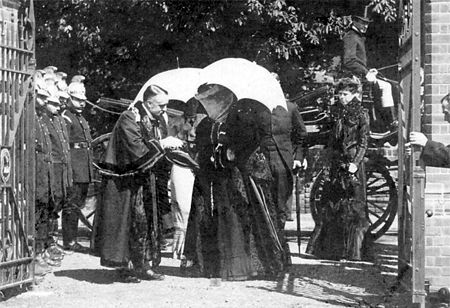
Mayor Shipley welcoming Princess
Christian at Alexandra Gardens, July 15th 1902
(An extract from a photograph included in our Alexandra
Gardens article)
The band
played 'God save the King' when she arrived and when she departed.
All the snobs had their photos taken. Sam came down to the Gardens
for a few moments then went out with us back to his office again.
After that we went to the Round Tower and saw the beautiful scenery
all round Windsor. We came home again, had tea then Sam took
Liz, Alice and I for a delightful row on the river. Sam did it
splendidly. (He did everything splendidly). We all enjoyed it
very much, in coming back we had a lovely view of the Castle;
it came to an end too soon and we landed safely on the bank.
Sam had to go back to the office and he hurried us home to let
mother and uncle see we were safe. We had supper then Sam gave
us a selection on the flute and bones. Just as he was playing
the 'Holy City', the cats joined in and that put an end to our
concert. Then Liz, Alice and Sam saw us safely to Cousin Wills
and we retired for the night.
All things
bright and beautiful,
All creatures great and small,
All things wise and wonderful,
The Lord God made them all.
Wednesday,
July 16th
Rose
at 8am. Had breakfast and went over to uncle's then went with
Alice to see the school children start for Burnham Beeches. We
did a little shopping and had dinner at Cousin Will's. In the
afternoon we went to the Castle to see the Curfew Tower and Stables,
also St. George's Chapel and the beautiful monument of Princess
Charlotte. After tea we went to the Alexandra Gardens to hear
the band play.
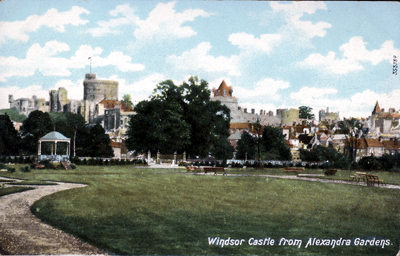
A hand coloured
postcard view of Alexandra Gardens and the Bandstand soon after
the opening of the gardens and about the time of Sarah Jane's
visit.
It was
a treat. When it was over Sam took me for a walk. I don't know
where, but it was 'All right'. We got home before Liz and Alice
and Sam gave us a selection on his whistle, then Liz and Alice
came in there was a general stir and a rattling of pots. Sam
and I had supper in the back yard. I enjoyed it very much; afterwards
we went to Cousin Will's and retired.
Thursday,
July 17th
Rose
at 7 am. Had breakfast then went to uncle's for Lizzie; from
there to the S.W. R. Station where we took the 10am train to
Waterloo. Sam and Alice saw us off. I did not like leaving them
behind.
From
Waterloo we took the bus to Liverpool St. Station, here we had
slight refreshment, then we took the train to Forest Gate. We
were very pleased to see Frank and his wife and children. Scoffer
is a fine little boy with his mischievous ways. After dinner
I went to sleep for two hours and when I wakened it was tea time
so I did not see much of Forest Gate. After tea we said 'Good
Bye' to Frank's wife and children and Frank went with us on the
tram to Aldgate and journeyed by the Underground Railway to Praed
St. We said 'Good bye' to Frank and went to Paddington Station.
Here we waited half an hour for a train to Windsor and arrived
home at 10.40 pm. Cousin Will and Sam met us at the G.W.R. Station;
owing to it being so late we did not go to uncle's. Sam told
me he had been two hours by himself. I felt very sorry for him;
he went part of the way with us then said good night. I afterwards
heard that he gave Lizzie a good lecture for being so late, but
of course Lizzie could not help it. Poor Liz was quite tired
out and so ended a most enjoyable day.
Friday,
July 18th
Rose
at 8am. Had breakfast and walked over to uncle's, then Alice
and I went out for a little shopping, we also made a visit to
Sam's office. He explained everything to us and showed me his
books and I must not forget his pin-cushion. He also took us
through the Goods Yard to the Signal Box, it was very interesting.
In coming back he took us across the S.W.R. line and Home Park.
After dinner we had a short rest then we all of us (omitting
Sam) had a lovely drive to Virginia Water. It was uncle's treat
for us and I am sure we could not have had a more pleasant outing.
On the way we went through the Long Walk. Here we met a lot of
Sailor Japs. They were very pleased to see us, we waved our hands
to them and they returned the complement and took their hats
off to us. When we reached the statue of George III, we got out
and had a walk around it. Passing along we came to Cumberland
Lodge and the pretty little church, also Cumberland Lake and
the Conservatory, we had a walk through the large Grape Vine
said to be the largest Grape Vine in the world. Then we drove
through Windsor Forest and on to Virginia Water. Here we had
a lovely walk by the waterside and saw the ruins and waterfall.
It reminded me of Shakespeare's words in 'As you like it',
'Sermons
in stones, books in running brooks and good in everything."
Alice
found a nice place for us where we had our tea, we were all ready
for it and enjoyed it very much. After tea we started for Windsor
and arrived safely home by 9.0pm. We found Sam buried in his
books and papers etc. preparing our journey home on the morrow,
but he soon cleared them all away, we had supper, said good night
to uncle, then Liz, Alice and Sam went with us to cousins Will's;
this was the last night we could be all together and I felt rather
sad, but -
Here
we suffer grief and pain,
Here we meet to part again,
In Heaven we part no more.
We said
'Good bye' to Cousin Will as we should not see him the next morning,
then we retired.
The day
is past and over,
All thanks 0 Lord to Thee.
Saturday,
July 19th
The
Last Day
Rose
at 7 am. Had breakfast. Sam came for our box punctually at 8am.
Then we had to say 'Good bye' to dear Emma and the dear baby
and Willie. I felt sorry to leave her, she had been so good to
us and made us so comfortable. We went over to Uncle's for the
last time. Alice went out with us, we did some shopping then
we waited for the Indian Troops to arrive. Sam joined us while
we were waiting. At last they came, 1,000 of them. It was a glorious
finish to the Programme of the week, a sight which I shall not
forget so soon.
After
they had passed into the Castle we hurried home to dinner. Then
the time for parting with Uncle arrived. It was very hard to
say 'Good bye' to Uncle. I felt it very much. At 12.40. we started
for the G.W.R. Station, we had a few minutes to spare before
the 1.00pm train started for Paddington, so we passed time away
by dropping pennies into the slot. Then we had to say 'Good bye'
to Lizzie and Alice, the dear girls, I felt very sorry to leave
them, they are so lively and had been such good company. The
train puffed out of the station; I watched them till I could
see them no longer. Then we left the stately old Castle and the
Royal Borough of Windsor far behind us. Sam went with us to Kings
X. We arrived at Paddington by 1.25. dep. from Bishops Rd. at
1.46. arrived at Kings X. Met. at 1.58. G.N.R.
We had
a short rest while Sam went about making the final arrangements
then we had slight refreshments. The time is drawing nearer for
our departure. At last the train comes puffing in. Sam puts us
in a comfortable apartment. The last moment has arrived. Sam
kissed us 'Good-bye'. There he stands waving his handkerchief,
the train moves slowly out of the station, each moment is leaving
us further and further apart, at last I can see him no longer.
I sit down with a very sad feeling.
'Parting
is such sweet sorrow'
We arrived
at Burnley at 9.00 pm.
Our holidays
are at an end and truly this has been the most enjoyable, instructive
as well as amusing holiday I have ever spent. Perhaps my cousins
would think I was not much impressed by what I saw, but if ever
they care to read my diary, they will think different.
I never
say one half of what I think, being of a quiet nature. What I
have seen and enjoyed will never be lost to me and I am sure
my visit to London and Windsor will ever remain in my memory.
God be
with you till we meet again,
Till we meet, Till we meet,
Till we meet at Jesus feet.
By His Councils guide uphold you,
In His arms securely fold you,
God be with you till we meet again.
Nil
desperandum
Why live
when life is sad, death only sweet?
Why fight when closest fight ends in defeat?
Why pray when purest prayer dark thoughts assail?
Why strive and strive only to fail?
Lives there are many around needing thy care.
Pray, there is one at hand, helping thy prayer.
Fight for the love of God, not for renoun.
Strive, but in His strength not in thine own.
Why hope when life has proved our best hopes vain?
Why love, when love is fraught with so much with pain?
Why not cool heart and brain in the deep wave?
Why not lie down and rest in the still grave?
Hope there is, Heavens joy laid up for thee.
Love, for True Love out lives its agony.
Part of our 'Windsor People' series, an area to exchange information
about past residents and well known characters. Click here for
other Windsor
People
|


